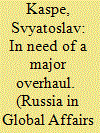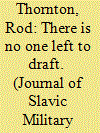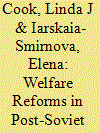| Srl | Item |
| 1 |
ID:
127008


|
|
|
|
|
| Publication |
2013.
|
| Summary/Abstract |
Twenty years after it was established, Russia's post-Soviet political system is still experiencing problems. The system is subject to such disorder and dysfunction that even the most loyal government official cannot help but notice. Russia's political system does not ensure that the objectives for which it was designed can be accomplished. The system's capacity to accumulate resources of various types (material, ideological, and human) and to distribute them is weak and continues to deteriorate, while the system's expenses are exorbitant. Moreover, it is becoming increasingly difficult to control the political system. Public trust in the government and other political structures is very low and the relatively high ratings of individual politicians cannot make up for it. The very same ratings, which in essence form the only bastion of the regime, face the risk of a sudden collapse.
We have almost forgotten that politics should have a value component (the fascination with perestroika proved to be short-lived). The absence of value guidelines beyond accounts of benefits and costs turns politics into a nasty parody of itself and deprives it of power and functionality.
|
|
|
|
|
|
|
|
|
|
|
|
|
|
|
|
| 2 |
ID:
123225


|
|
|
|
|
| Publication |
2013.
|
| Summary/Abstract |
Since the end of the Cold War, a succession of Russian government leaders has tried to abolish conscription. But ending Russia's conscript military and replacing it with one manned by professionals has not proven to be an easy task. In fact, it has proven impossible. It appears now, and especially after the recent removal of Defense Minister Anatoliy Serdyukov, that conscription will remain for the foreseeable future. Moreover, the attempts that the politicians have made to end conscription have left, in particular, the Russian army marooned between two manning schema: not quite professional and not quite conscript. This current arrangement is both strategically unsound and politically unsustainable.
|
|
|
|
|
|
|
|
|
|
|
|
|
|
|
|
| 3 |
ID:
190462


|
|
|
|
|
| Summary/Abstract |
In recent years, the Russian government has adopted major social policy reforms that incorporate contemporary state-of-the-art international principles and practices. New legislation has mandated deinstitutionalisation, that is, closing Russia’s large network of residential facilities for children ‘without parental supervision’ (‘deti bez popecheniya roditelei’)Footnote1 and people with disabilities. Programmes of foster care and adoption are emptying orphanages, while efforts have been made to reorient efforts of social workers and family courts towards preserving families. Children with disabilities are being moved out of institutions and integrated into public schools, while adults now have possibilities to live and work in communities that have been made more accessible. ‘Active Ageing’ policies are designed to enhance the agency and self-determination of older people. Schools have begun to integrate the children of migrant workers. Some social service provision has been outsourced to socially-oriented non-governmental organisations (SONPOs; see Cook et al. Citation2021) in order to allow a choice of providers and services. While the progress of these reforms has been uneven, collectively they reflect the Russian government’s efforts towards integrating into mainstream society groups that have for decades been marginalised or institutionalised.
|
|
|
|
|
|
|
|
|
|
|
|
|
|
|
|